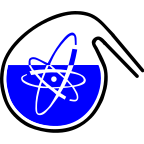Speaker
Description
The management of radioactive waste requires an accurate description of source terms
and their behavior in natural or engineered barriers. Many radioactive waste involve organic
contaminants, either included in the source term (e.g. 14C bearing lixiviates of graphite waste)
or released simultaneously with radionuclides (e.g. degradation products of plastics or
adjuvents in cementitious materials). The migration of organic compounds is largely
investigated in cementitious and geological environments, as well as their effect on
radionuclides confinement [1]. This behavior strongly depends on the lipophilicity of
compounds, even for ionized species [2]. This property is therefore an interesting parameter
to quantify, useful for further performance assessments. However, some hazardous waste and
degradation mixtures are sometimes too complex to allow an exhaustive characterization of
organic compounds and their lipophilicity. In this context, a new process “Partition of Aqueous
Waste” (Paw) was developed. It quantifies and classifies organic compounds from unknown
mixtures regarding their lipophilicity. The process uses sequential liquid-liquid partition
equilibria. Its experimental validation will be illustrated with different kinds of analyses, e.g.
organic carbon, UV-Vis, 14-C. Using a specific mathematical model, a “lipophilic” profile of the
sample is obtained. Hence, the Paw process provides insights on the constituting solutes of the
mixtures and their environmental behavior. Such data may be relevant for performance
assessments in the context of radioactive waste storage.
[1] Fralova, L., Lefèvre, G., Madé, B., Marsac, R., Thory, E., Dagnelie, R.V.H., 2021. Effect of
organic compounds on the retention of radionuclides in clay rocks: mechanisms and
specificities of Eu(III), Th(IV), and U(VI). Appl. Geochem., 104859
[2] Guo, N., Disdier, Z., Thory, E., Robinet, J.-C., Dagnelie, R.V.H., 2021. Mobility of organic
compounds in a soft clay-rich rock (Tégulines clay, France). Chemosphere, 275, 130048.

